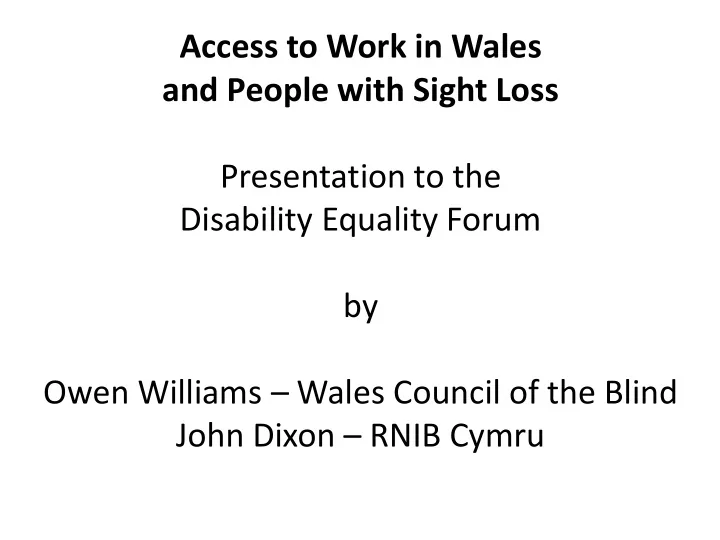

Access to Work in Wales and People with Sight Loss Presentation to the Disability Equality Forum by Owen Williams – Wales Council of the Blind John Dixon – RNIB Cymru
Recommendation 1 : there needs to be more sensitivity around the contact arrangements and closing a case should only be carried out in consultation with the client. Recommendation 2: AtW to consider better informing the public of what’s available under the scheme so that an applicant is more confident to apply for support unaided.
Recommendation 3: that AtW reinstates the practice of a claimant being assigned a named advisor as this provides continuity and stability for the client. This should also be available as an easier telephone pathway, effectively bypassing the call centre.
Recommendation 4: AtW advisors receive specific vision impairment awareness training to include knowledge of sight conditions in addition to Disability Equality Training and that the awareness training should be delivered by blind and partially- sighted people themselves to serve as positive role models and adopting the ‘nothing about us without us’ approach.
Recommendation 5: assessments should be offered as a matter of right and conducted by an individual who has a broad knowledge of sight loss and associated access technologies.
Recommendation 6: that AtW works with 3SC, the company that has the contract to commission assessments in Wales, to ensure it provides specific training to the assessors around vision impairment and the technologies available. This will ensure the client will benefit from receiving advice and recommendations that fully support their needs.
Recommendation 7: that where an assessment has been conducted, it should form the basis for the subsequent package of support. Recommendation 8: that clients are able to offer suggestions and modifications to the final report without having go through a formal appeals process.
Recommendation 9: that AtW advisors gain an understating of the need to promote independence, preserve dignity and ensure confidentiality with regard to completion of forms. Recommendation 10: that AtW implements the production of accessible documents in line with their policy of capturing the preferred format of each client.
Recommendation 11: that digital exclusion is accounted for in plans to digitise the application and claims processes. Recommendation 12: that AtW contacts people with sight loss, giving them advanced notice of their claim period coming to an end.
Recommendation 13: that clients’ equipment needs are reviewed periodically. Recommendation 14: that people with sight loss, who are unable to drive their cars themselves because of their impairment, should be allowed a more flexible approach with regard to this rule.
Recommendation 15: that advisors recognise the differing travel needs of different clients, sometimes in relation to their personal abilities, and sometimes in relation the requirements of the job. Recommendation 16: that AtW promotes better understanding amongst staff and clients around scope and purpose of travel training.
Recommendation 17: the advisors must promote choice in how the hours for a support worker are allocated. Recommendation 18: clients whose personal budgets exceed the cap are contacted well in advance to discuss solutions around adapting to the cut in the level of support.
Recommendation 19: that AtW abandons the use of the tax threshold as a measure of eligibility for self-employed applicants in favour a more holistic assessment of a business’ viability. Recommendation 20: issue guidance around the payment procedure and ensure consistence and timely payments.
Recommendation 21: establish a direct line of contact between the client and the claims team. Recommendation 22: awareness should be raised of the scope and purpose of Access to Work amongst employers through literature, through the DWP website.
RNIB update, looking at the strengths and problems of the Access to Work scheme in Great Britain. Any questions?
Recommend
More recommend